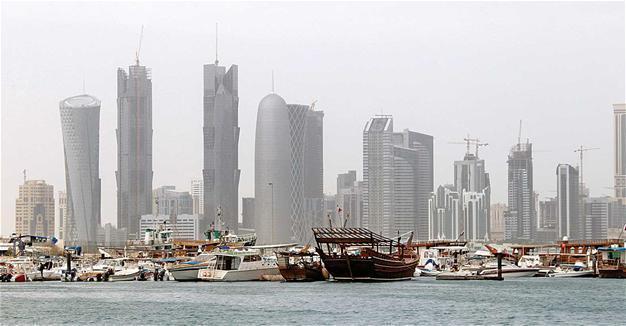Qatar rebuffs terrorism list as Gulf crisis grows

The diplomatic crisis between Qatar and other Gulf states escalated further on June 9 as Doha dismissed as “baseless” a terrorist blacklist drawn up by Saudi Arabia and its allies.
Saudi Arabia, the United Arab Emirates, Egypt and Bahrain - which accuse Qatar of supporting Islamist extremist groups - released the list of 59 people and entities linked to “terrorism.”
On the list notably were Doha-based Muslim Brotherhood spiritual leader Yusuf al-Qaradawi as well as Qatari-funded charities.
However, in a bullish response, isolated Qatar said the list had no basis in reality and claimed it had the strongest record in the region on countering extremism.
“The recent joint statement issued by the Kingdom of Saudi Arabia, Bahrain, Egypt and the UAE regarding a ‘terror finance watch list’ once again reinforces baseless allegations that hold no foundation in fact,” read a statement from Qatar’s government.
“Our position on countering terrorism is stronger than many of the signatories of the joint statement - a fact that has been conveniently ignored by the authors.”
It added: “We lead the region in attacking the roots of terrorism.”
The June 9 spat was unlikely to do anything to relieve tensions in the region in a spiraling political crisis, with U.S., Russia, Europe Turkey and Iran getting involved in dialogue.
On June 5, Saudi Arabia, the UAE, Egypt and Bahrain led a string of countries that cut ties with Qatar over what they say is the emirate’s financing of extremist groups and its ties to Iran, Saudi Arabia’s regional arch-rival.
They also banned Qatar Airways from using its airspaces and closed the country’s only land border, which it shares with Saudi Arabia, moves which Doha’s foreign minister, Sheikh Mohammed bin Abdulrahman Al-Thani, has termed a “blockade.”
Sheikh Mohammed held surprise talks in Germany with his counterpart Sigmar Gabriel on June 9.
In a press conference held in the small town of Wolfenbuettel, he claimed the actions taken by Saudi Arabia and its allies amounted to “a clear breach of international law.”
Hitting out at the blacklist, he added: “There is a continuous escalation from these countries ... but our strategic options are still diplomacy and dialogue.”
So far, European countries have largely stayed on the sidelines in the dispute involving several of their allies.
Gabriel stressed that “this is the hour of diplomacy.”
The Qatari minister was expected to travel on to Moscow on June 10 to meet his Russian counterpart Sergei Lavrov.
Qatari officials also announced on June 9 that he held a telephone conversation with U.S. Secretary of State Rex Tillerson during which “mutual relations” were discussed.
The blacklist is the latest in a string of allegations made by Saudi Arabia and its allies against Qatar since the crisis erupted late last month.
The comments from Qatar came a day after Sheikh Mohammed rejected any interference in its foreign policy and said his country would never “surrender.”
As well as other measures, the Arab countries have ordered Qatari citizens out within 14 days.
Qatar’s human rights committee said those measures had split families and that hundreds of people had been affected.
The feud has raised fears of wider instability in an already volatile region that is a crucial global energy supplier and home to several Western military bases.
Kuwait - which unlike most of its fellow Gulf Cooperation Council (GCC) members has not cut off ties with Qatar -- has been leading efforts to mediate.
 The diplomatic crisis between Qatar and other Gulf states escalated further on June 9 as Doha dismissed as “baseless” a terrorist blacklist drawn up by Saudi Arabia and its allies.
The diplomatic crisis between Qatar and other Gulf states escalated further on June 9 as Doha dismissed as “baseless” a terrorist blacklist drawn up by Saudi Arabia and its allies.